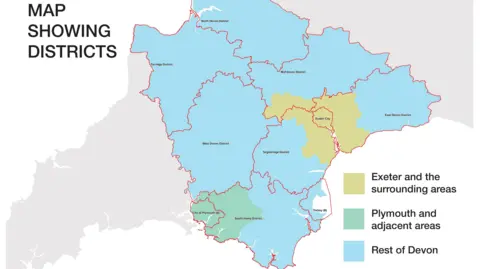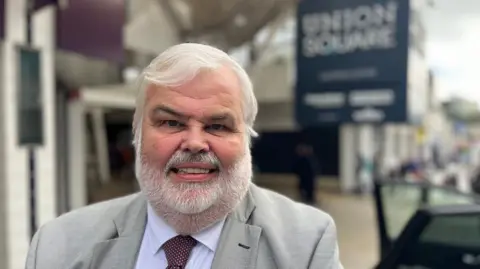Miles DavisDevon political reporter
A new plan for Devon to be carved up into four unitary authorities has emerged.
Under the government’s massive shake up of local government, all district and county councils will be abolished so that one authority will run all council services in any one area.
Plymouth, Torbay and Exeter have now revealed they are all working together on a plan to create four unitary authorities – one for each of their urban areas and one for the rest of Devon.
This new plan is directly opposed to schemes put forward by the district councils and by Devon County Council, whose leader described it as an “attempt to cling on to the vestiges of power”.
 Exeter City Council
Exeter City CouncilCurrently, most of Devon is governed by a two-tier system where services like housing and recycling are run by eight district councils while issues like highways and social care are run by Devon County Council.
In Plymouth and Torbay, all council services are run by unitary authorities that are already in place – Plymouth City Council and Torbay Council.
The government has indicated it wants any unitary authorities going forward to have a population of about 500,000 but has said there could be some flexibility around that figure.
Torbay, which has a population of about 140,000, has now said it wants to continue as a unitary authority after local government reorganisation and wants to keep its boundaries as they are.
Plymouth wants to expand its population – currently about 265,000 – by taking over parts of the South Hams.
Exeter City Council currently operates at district council level but wants to expand to take in towns like Exmouth, Dawlish and Crediton and become a unitary authority in the local government reorganisation.
Torbay, which is Conservative-controlled, announced its plan on Friday which was swiftly backed by Plymouth and Exeter, which are both Labour-controlled.

David Thomas, leader of Torbay Council, said in a statement: “By taking a collaborative, evidence-based approach, we can build a model of local government that is more responsive, efficient, and aligned with the way people live their daily lives.”
Plymouth City Council and Exeter City Council issued a joint statement which said urban areas like Plymouth, Exeter and Torbay were “the engines of growth for both urban and rural communities”.
Plymouth’s leader, Tudor Evans, said: “This model gives us the best of both worlds: councils that are big enough to be sustainable, but close enough to stay accountable.”
Phil Bialyk, leader of Exeter City Council, said the plan recognised “the unique characteristics of Devon’s urban and rural landscape and communities”.
Devon County Council previously announced it wanted to see a new One Devon unitary authority which would keep the same boundaries as the county council and retain Plymouth and Torbay as they are.
In response to the plan put forward by Plymouth, Exeter and Torbay, the Devon County Council leader, Liberal Democrat Julian Brazil, said: “It’s just a blatant attempt by Labour and the Conservatives to cling on to the vestiges of power in Devon.”
The district councils – excluding Exeter City council – have put forward an idea known as the 4-5-1 plan.
That would involve one unitary authority for West Devon, Teignbridge, South Hams and Torbay, a second authority for North Devon, Torridge, Mid Devon, East Devon and Exeter with Plymouth remaining as a standalone unitary authority.
All plans will need to be submitted to government by 28 November with feedback expected from the government around March 2026.





